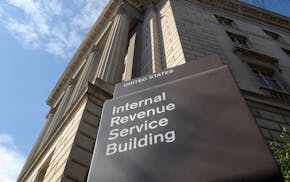A heads-up to basically everybody — those with an elderly loved one depending on Medicare and Social Security or those planning to draw upon these retirement programs down the road. The code words Congress uses to debate these programs' future has changed.
In 2011, as Congress wrangled over a so-called "Grand Bargain" to balance the nation's budget, the preferred term was "entitlement programs.'' But as a Senate Committee on the Budget hearing made clear last week, two new appellations have emerged — "mandatory spending" and "autopilot programs." That's unfortunate, because few people other than federal budget wonks rapidly grasp that these refer to Medicare, Social Security and Medicaid, all three of which form a vital safety net to provide health care to seniors and protect them from impoverishment.
For those wanting to safeguard these programs, this is a moment to be vigilant and vocal. After a grim new Congressional Budget Office (CBO) report projected substantial increases in deficit spending for at least the next decade, there are understandable concerns about the amount of red ink the nation is running. These programs' size — Medicare's annual spending topped $672 billion in 2016, for example — coupled with conservatives' discomfort with social insurance, make them a tempting cost-cutting target for congressional Republican majorities.
But even a cursory read of the CBO report makes clear how disingenuous it is to cite the analysis as immediate justification for cuts like these. The report, which details the changes in the budget outlook since last summer, provides ample evidence that these programs are not the cause of the deteriorating fiscal outlook detailed by the agency.
"Of the $1.5 trillion in additional debt that the CBO thinks is coming over the next 10 years compared to its previous projections, absolutely none of it comes from growth in Social Security, Medicare or Medicaid,'' said Michael Linden, a federal budget expert and fellow at the nonpartisan, New York-based Roosevelt Institute. "To the extent that people are worried about deficits and debt in this CBO report, tax cuts are the primary culprit."
The tax cuts Linden refers to are those in the 2017 Tax Cuts and Jobs Act passed in December by Congress. The package included permanent cuts in corporate rates and temporary reductions for individual taxpayers. The CBO report is the first from this respected agency since the cuts passed. The report also takes into consideration two spending bills passed this year.
The CBO's conclusions undercut promises made last year by the Trump administration that the tax cuts would pay for themselves. Instead, the CBO projects cumulative deficit spending for 2018-2027 that is more than $1.5 trillion larger than the $10.1 trillion it projected last June. And yes, the agency's findings take into account the economic growth the CBO says the tax cuts will spur. The additional economic activity won't even come close to balancing the lost revenue.
The Senate Budget Committee hearing on Wednesday understandably sounded the alarm on the rising red ink, which is where the new "mandatory spending" terminology surfaced. To be fair, the CBO report also raised concerns about the growing financial pressure from these programs as the population ages.
But these concerns are nothing new. Simpson-Bowles and other debt plans debated earlier this decade put a spotlight on this. The Star Tribune Editorial Board has long supported serious efforts to build a long-term financial framework that would bring the nation's spending and revenue into better balance. As part of that, reforms to big social insurance programs must be on the table.
The nation already faced a monumental challenge delivering on its promises to seniors. But Congress recklessly made the problem worse. Undoing this damage must come first before changes to programs seniors depend on.
Readers Write: Politicized education, presidential debates, election strategies, small-town papers

Taxes increasingly paying for the past — not the future
!["Since the [Hennepin Healthcare System] Board took control in 2007, CEO pay increased by more than 142%. Meanwhile, that same board sunsetted employee](https://arc.stimg.co/startribunemedia/J7MD7DSJWMP3KYIYUSCQTABOAA.jpg?h=91&w=145&fit=crop&bg=999&crop=faces)

